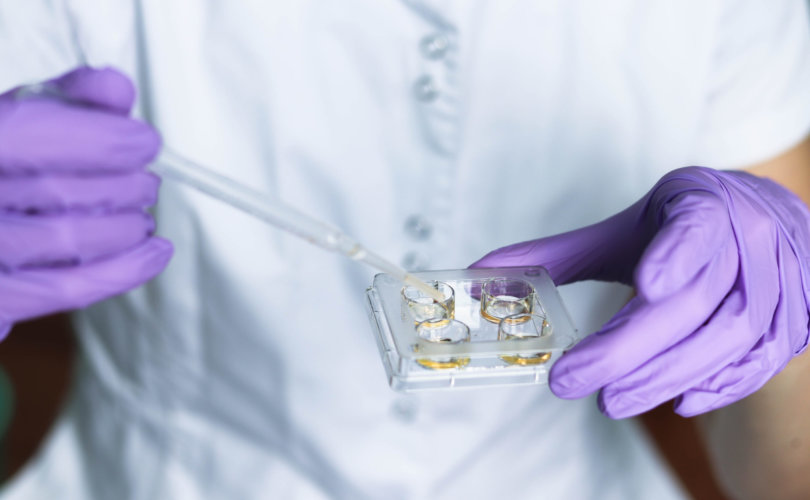(LifeSiteNews) – In 2005, Hollywood released a film titled The Island, a dystopian story about a group of people who live their strictly regimented lives in a facility. The story focuses on a worker named Lincoln Six Echo who, through a series of coincidences, discovers the horrifying truth about the facility he lives in and the fate he and his fellow residents face: They are clones created for the purpose of organ harvesting should those who paid for their creation ever need it. They are human beings, yes—but the sole purpose for their existence is to be a supply of spare organs and body parts.
A few years ago a pro-life leader noted in an interview that the film carried inherently anti-abortion messages. As it turns out, The Island could turn out to be prophetic, too. The Israel-based biotech firm Renewal Bio is hoping to create “synthetic” human embryos for the explicit purpose of harvesting their organs for both transplanting as well as treating infertility, aging, and genetic diseases. According to the New York Post, Renewal Bio has “claimed that it successfully used advanced stem cell technology and artificial wombs in order to grow mouse embryos which continued to develop for several days.”
Now that the process has worked with mouse embryos, which the MIT Technology Review says stayed alive “until they developed beating hearts,” blood flow, and the beginnings of a brain, researchers want to use the same process to create human embryos. Jacob Hanna of the Weizmann Institute of Science in Israel and the founder of Renewal Bio published the results in the journal Cell. He is enthusiastic about the potential. “The embryo is the best organ-making machine and the best 3D bioprinter—we tried to emulate what it does. Remarkably, we showed that embryonic stem cells generate whole synthetic embryos, meaning this includes the placenta and yolk sac surrounding the embryos.”
What Hanna is proposing sounds very much like a small-scale version of what the villains did in The Island—bringing new human beings into existence for the explicit purpose of pillaging them for their parts to sustain other, older human beings. Hanna told the Guardian that: “We are truly excited about this work and its implications.” Human embryos, Hanna believes, will essentially be a renewable resource that can be used to “treat medical ailments” and reverse “declining birth rates and fast aging populations.”
As Renewal Bio’s website puts it: “To solve these complex and compounding issues, Renewal Bio aims to make humanity younger and healthier by leveraging the power of the new stem cell technology.” In fact, Hanna insists that these new, “synthetic” embryos—which are created without fertilized eggs—are “an ethical and technical alternative to the use of [natural] embryos.” According to Hanna: “In Israel and many other countries, such as the US and the UK, it is legal and we have ethical approval to do this with human-induced pluripotent stem cells.”
“This is providing an ethical and technical alternative to the use of embryos.” Some ethicists are already concerned by these experiments and have called for government oversight “to ensure that the advancements in technology that enable replicating human embryos isn’t abused.” Geneticist Paul Tesar of Case Western Reserve University admitted that there are always risks involved. “There will always be a grey area,” he told StatNews. “But as scientists and as a society we need to come together to decide where the line is and define what is ethically acceptable.”
Perhaps there is some way to use stem cells to create organs without killing human beings created for that purpose. But at the moment, it very much sounds as if a biotech firm is planning to create individual human beings at the earliest stages of development for the purpose of utilizing them for spare parts. That is not ethical ground. That is Frankenstein territory.





